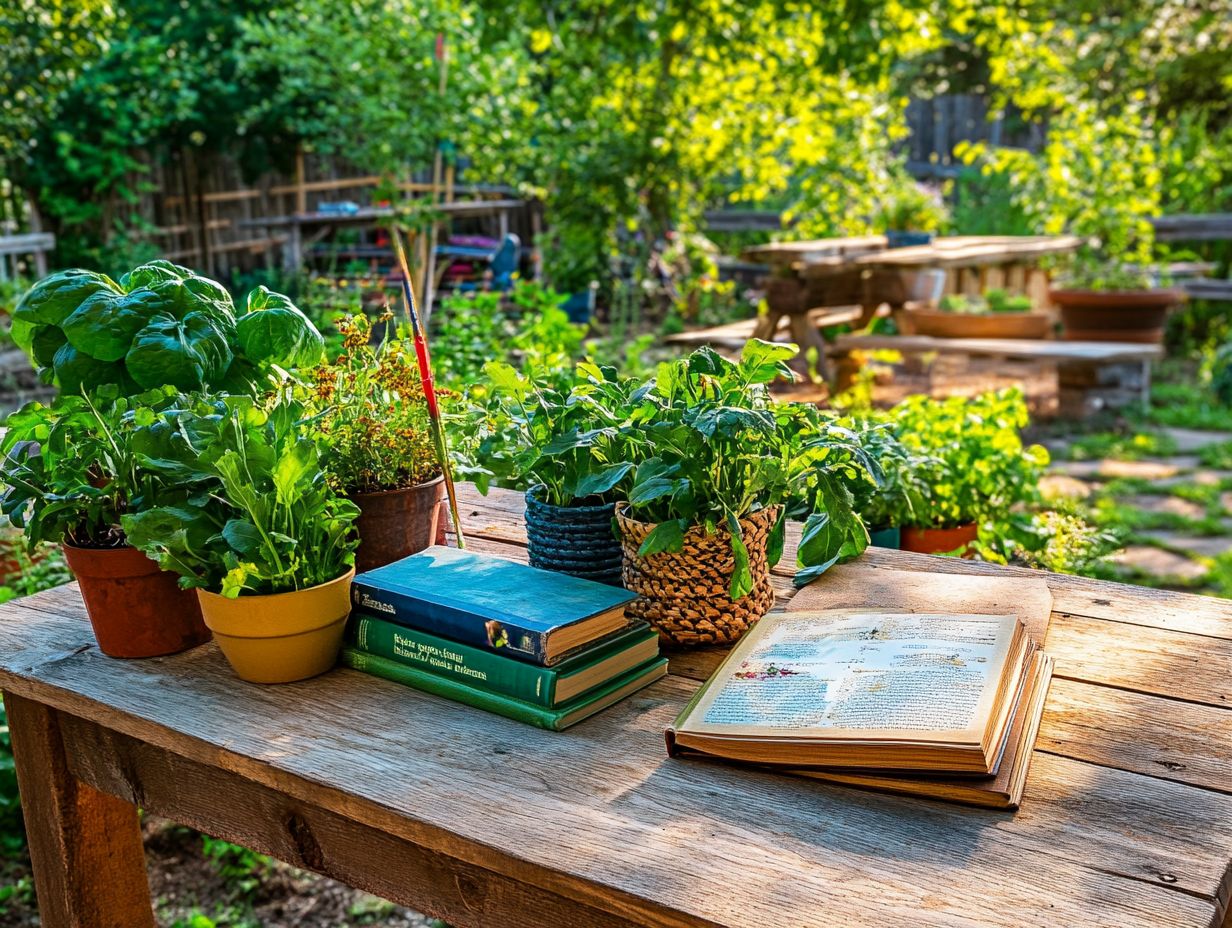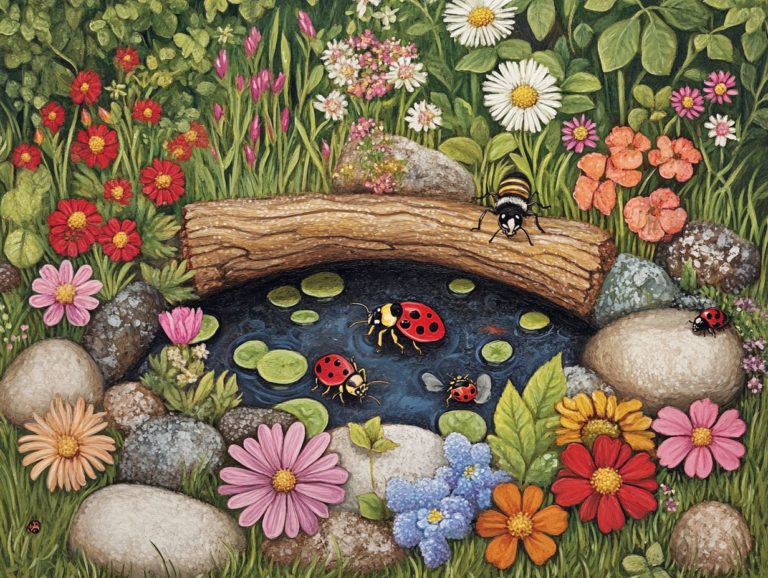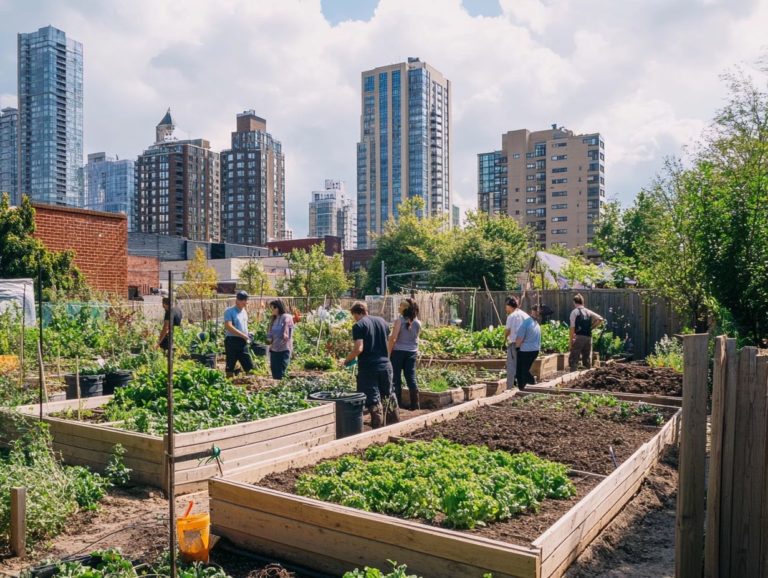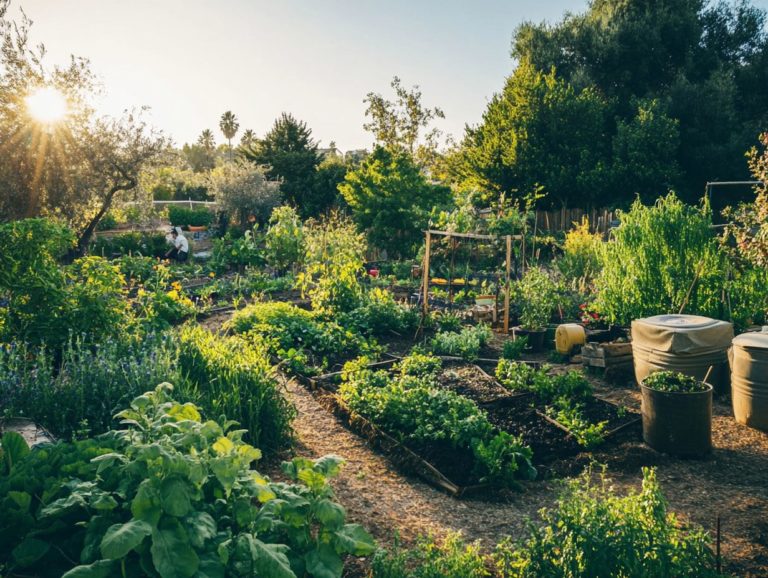What Are the Best Resources for Learning Permaculture?
Permaculture, a global community, transcends mere gardening techniques. It embodies a holistic approach to sustainable living through innovative solutions in ecological design. It champions harmony with nature.
Let s dive into the core principles of permaculture that can change how you interact with nature. You ll also find guidance on various resources to enrich your understanding, from online courses and free courses to must-read books and certification programs.
Inspiring real-life examples of successful permaculture projects and the communities nurturing these practices are showcased. Join us as we uncover how permaculture can transform your relationship with the environment!
Contents
- Key Takeaways:
- Basic Principles of Permaculture
- Resources for Learning Permaculture
- Real-Life Examples of Permaculture
- Frequently Asked Questions
- What are the best resources for learning permaculture?
- What books are recommended for learning about permaculture?
- Are there any online courses available for learning permaculture?
- What workshops can I attend to learn more about permaculture?
- What is the benefit of hands-on experience when learning about permaculture?
- Are there any online communities or forums for discussing permaculture?
Key Takeaways:

- Permaculture is a sustainable design system that focuses on working with nature, not against it. It supports biodiversity, conservation, and resilience, making it an important practice in our changing world.
- Key principles of permaculture include using resources efficiently, promoting diversity, and integrating systems. Understanding these concepts and ethics is crucial for effective permaculture design certification programs that enhance knowledge.
- The best resources for learning permaculture include online courses and workshops, books and publications, and permaculture design certification programs. These resources provide invaluable knowledge and practical skills for implementing permaculture practices.
What is Permaculture and Why is it Important?
Permaculture is an innovative system of ecological design principles that enables you to create sustainable homes, such as those promoted by Food Not Lawns. This method emulates natural ecosystems and addresses the pressing challenges of climate change.
This holistic approach weaves together diverse disciplines such as sustainable agriculture, environmental education, and community development, making it essential for cultivating resilient living environments. By considering the intricate relationships between living organisms and their surroundings, permaculture promotes practices that safeguard the sustainability of our food systems and biodiversity for future generations.
By embracing principles like diversity, closed-loop systems, and organic resource management, you nurture not only human needs but also the health of the planet. Notable initiatives, such as Food Not Lawns, inspire you to transform traditional lawns into thriving ecosystems that champion food sovereignty through community projects that inspire resilience within communities.
Organizations like the Permaculture Research Institute play a pivotal role as well, providing education and training on sustainable practices around the globe.
These methods do more than just reduce greenhouse gas emissions; they also enhance soil fertility and conserve water, illustrating how permaculture can profoundly impact ecological systems and help mitigate the effects of climate change.
Basic Principles of Permaculture
The fundamental principles of permaculture focus on establishing sustainable systems and ecological gardens that promote biodiversity and harmonize with nature. This approach emphasizes ecological design and offers innovative solutions tailored to the unique characteristics of specific environments.
Key Concepts and Ethics
Key concepts and ethics in permaculture serve as your guiding stars, helping you develop systems that are environmentally friendly, socially just, and economically viable. This approach crafts a balanced perspective on ecological design.
By embracing the three core ethics care for the earth, care for people, and fair share you can cultivate sustainable practices that nourish both ecosystems and communities. Zoning helps you divide land into sections for better use, while sector analysis assists in identifying natural flows and influences within your landscape.
Engaging with local communities fosters collaborative learning and resource sharing while enhancing resilience. Exciting resources are ready for you to explore, such as online forums and workshops, offering invaluable support and insights.
By participating in these networks, you solidify your understanding and inspire innovative approaches to creating a sustainable future.
Resources for Learning Permaculture

A treasure trove of resources awaits if you’re eager to delve into the world of permaculture. You can explore various online courses, including the best online courses for permaculture, and take advantage of free offerings. Additionally, immerse yourself in insightful books and engage with community forums, like the Permies forum, which connects you with local mentors for support and study groups.
The opportunities for learning are abundant and accessible, designed to enrich your journey in sustainable living.
Online Courses and Workshops
Online courses present a remarkable opportunity for you to explore permaculture education. Whether you’re a beginner or seeking practical experience, hands-on workshops in ecological design are available.
These platforms greatly enhance your understanding of sustainable practices and environmental rules essential for permaculture. For example, Permaculture Voices and Geoff Lawton offer various workshops that include hands-on ideas, practical gardening techniques, and community-focused design strategies.
By engaging with expert instructors, you deepen your comprehension of permaculture concepts and have the chance to apply your knowledge in real-world scenarios. Collaborating with fellow learners equips you to implement effective sustainable solutions in your environment.
Books and Publications
Numerous permaculture books and publications stand as invaluable resources to deepen your understanding of ecological gardening, sustainable systems, and the vibrant permaculture community, including the top books on permaculture gardening.
These texts provide insights into diverse practices and principles that can transform how you interact with your environment. From foundational works outlining the ethics of permaculture to guides on designing self-sustaining landscapes, each publication offers unique contributions to your knowledge.
Authors like Bill Mollison and David Holmgren present essential frameworks that clarify the subject. As you explore further, you’ll encounter valuable discussions on water management, soil health, and biodiversity in notable journals and articles, showcasing the ongoing evolution of this transformative design philosophy.
Permaculture Design Certification Programs
Participating in a Permaculture Design Certification (PDC) program offers you structured education paired with invaluable hands-on experience. This equips you with the skills necessary to implement sustainable practices while connecting you with local mentors for ongoing learning.
These programs feature a comprehensive curriculum that delves into the key principles of permaculture, design strategies, and ecological awareness. You ll engage in various hands-on projects that not only encourage real-world application of concepts but also foster creativity and critical thinking.
The involvement of local mentors enhances your experience by providing personalized guidance and insights into regional ecosystems and community needs. Reputable organizations, like the Permaculture Research Institute, add a layer of credibility to these certifications, significantly bolstering your professional profile.
By earning a PDC certification, you re not just validating your expertise; you re also unlocking new opportunities in sustainable design, education, and community development.
Real-Life Examples of Permaculture

Real-life examples of successful permaculture projects highlight the transformative potential of this ecological design approach. These projects range from vibrant community initiatives to regenerative homesteads, demonstrating how individuals and groups can positively impact their environments.
Across the globe, successful permaculture projects are shining examples of how you can transform your community! These initiatives foster ecological gardens and sustainable practices that effectively tackle modern challenges.
From urban rooftop gardens in New York to rural farms in Brazil, these efforts often emphasize the importance of native plants. This approach enhances biodiversity while minimizing resource usage. Funding from local government grants, non-profits, and community crowdfunding sources plays a crucial role in launching these initiatives, enabling you and your neighbors to reclaim your environments.
Take, for instance, a permaculture project in Australia that cleverly employed tree guilds. A tree guild is a planting strategy where different types of plants, such as fruit trees and those that help enrich the soil, are grown together. This integration not only improved soil health but also boosted crop yields. The positive effects extend beyond individual gardens, enhancing food security and inspiring a shared commitment to environmental stewardship within neighborhoods.
Permaculture Communities and Organizations
Permaculture communities and organizations are vital in promoting ecological practices and building connections through forums like the Permies Forum. They support initiatives such as sustainable education, community resources, online courses, and donation-optional materials for permaculture, ecological design, and regenerative homesteads.
These entities offer valuable resources for sustainable agriculture, community resilience, and local mentorship. They also foster a sense of shared purpose and collaboration among practitioners worldwide. By participating in workshops, online courses, and regional events, you can enhance your understanding and practice of permaculture principles that focus on ecological design and site assessment.
For example, platforms like the Permaculture Association’s forums and the Global Permaculture Network create vibrant spaces for members to share best practices and innovative solutions, troubleshoot challenges, and celebrate achievements. Engaging in these interactions not only improves educational outreach but also inspires new projects centered on permaculture techniques and ecological gardens, paving the way for a sustainable future through collective wisdom and practical experience.
Frequently Asked Questions
Here are some common questions about learning permaculture and the resources available:
What are the best resources for learning permaculture?

Many valuable resources exist for learning about permaculture, including the best resources for permaculture educators, books, online courses, workshops, and hands-on experiences through study groups.
What books are recommended for learning about permaculture?
Some highly recommended books include Gaia’s Garden by Toby Hemenway, The Permaculture Handbook by Peter Bane, and Introduction to Permaculture by Bill Mollison and Reny Mia Slay.
Are there any online courses available for learning permaculture?
Yes, numerous reputable online courses are offered through institutions like Oregon State University and the Permaculture Research Institute.
What workshops can I attend to learn more about permaculture?
Various workshops and events worldwide focus on permaculture. These range from one-day sessions to multi-week courses, covering topics such as design principles, gardening techniques, and sustainable living practices.
What is the benefit of hands-on experience when learning about permaculture?
Hands-on experience is invaluable for learning permaculture. It allows you to see practical applications in action and learn directly from experienced practitioners. This environment also enables you to ask questions, make mistakes, and learn by doing.
Are there any online communities or forums for discussing permaculture?
Yes, many online communities and forums are dedicated to permaculture. These platforms are excellent for discussing ideas, asking questions, and connecting with like-minded individuals.
We encourage you to explore these resources and join a community to further your knowledge and practice of permaculture!






